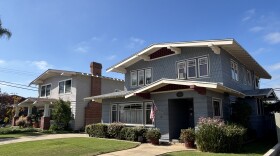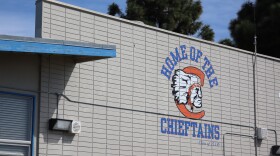
A year ago, Mari d'Alessandro got some of the worst news a mother can get. She had taken her son, Hugo, for a routine checkup, and the pediatrician told her Hugo had cancer. He was only 10.
Since then, Venezuela has faced economic and political upheaval that has led to food riots — and now, according to doctors and patients, a health crisis as well.
"You can't find the medicines," d'Alessandro says. "The doctor told me I'm going to have to pay six or seven thousand dollars for just one of the medicines, if I can even get it on the black market."
And that's in a country where many earn the equivalent of $15 or $20 a month.
With her son's life at stake, d'Alessandro has come to realize that it's all up to her.
At Caracas's public University Hospital, a doctor checks on a patient who has been waiting for an operation on her infected leg for several weeks.
She's worried that if the infection grows worse, her leg might have to be amputated. She says the hospital has none of the medicines she needs so she has to buy all her own antibiotics. So she sends her dad out to scour the black market.
Her doctor, Daniel Garibaldi, tells me the hospital doesn't have sutures for stitches. He even brings his own soap from home to wash his hands.
He says the situation has worsened in the last few months.
Like most things in Venezuela, there are two very different stories about what's happening.
The government maintains there is no health crisis and refuses to accept help from international organizations.
Venezuela's health minister Luisana Melo appears daily on state-run television, discussing how production of key medicines is being ramped up and Venezuela can provide most of what it needs.
But when I interview Dr. Douglas Leon Natera, president of the Venezuelan medical association, he disagrees. He charges, quite simply, that the health minister is lying.
"I think the minister must be living in a different country," he says. In the 300 public hospitals in Venezuela, he says, you'll find only 5 percent of what's needed in surgical equipment and medicines.
Back at the cancer clinic, Mari d'Alessandro, tells me her son just finished a chemo treatment last week. She needed a particular medicine to raise his white blood cell count. She hasn't been able to find it yet.
I ask 11-year-old Hugo if he's worried. He says no. He says he still plans to be a paleontologist when he grows up, because he loves dinosaurs and wants to dig up their fossils.
His mother hugs him tight, tears pooling in her eyes.
Copyright 2016 NPR. To see more, visit http://www.npr.org/.






